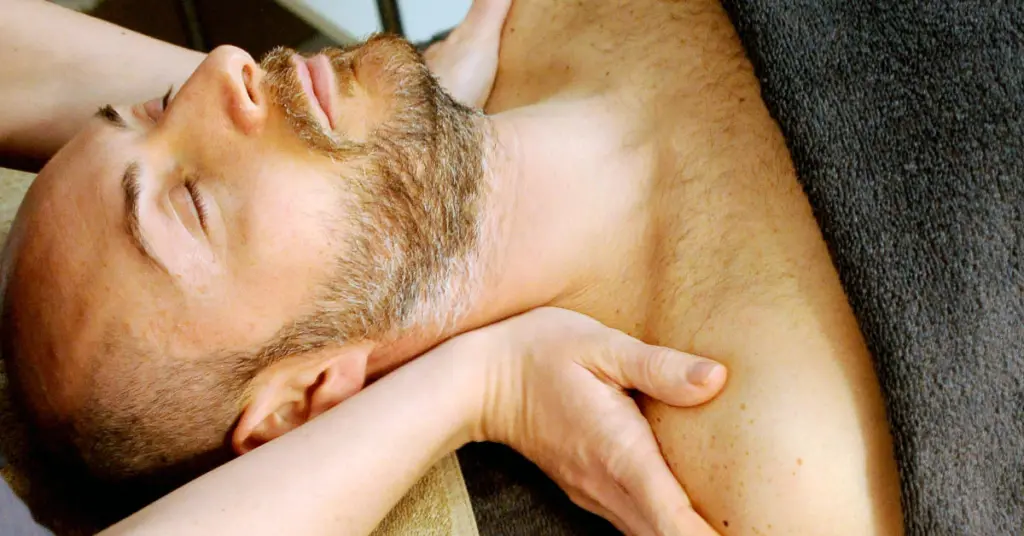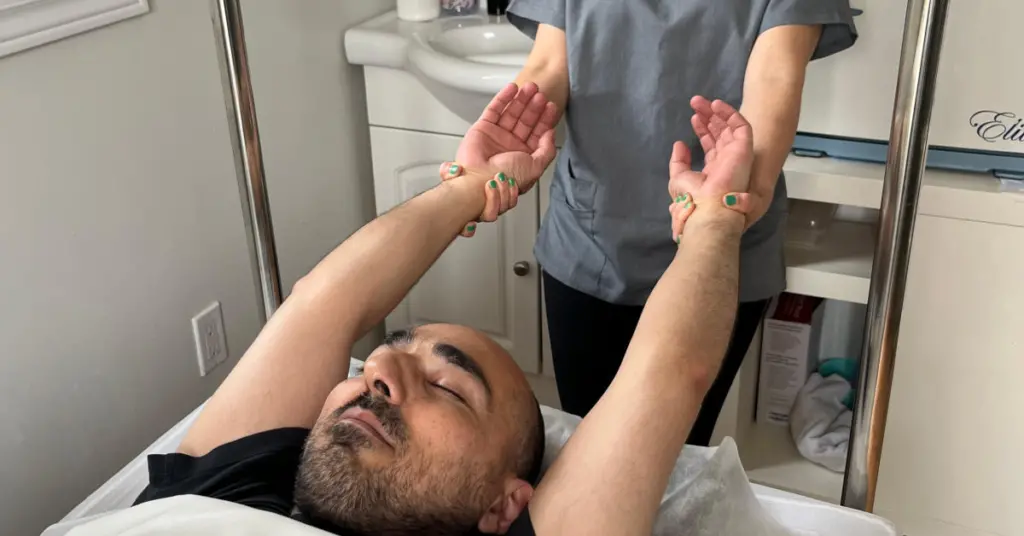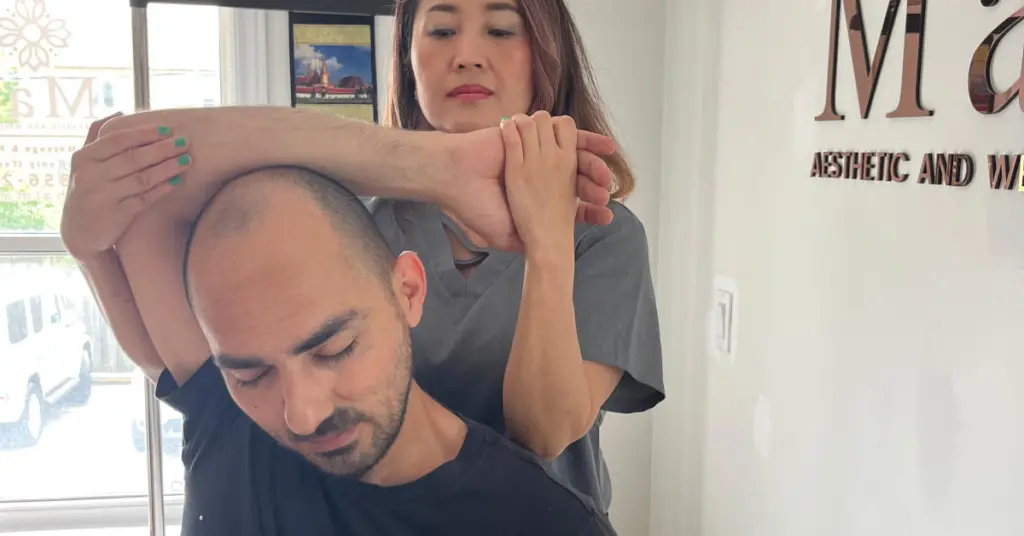Muscle Tension: A Comprehensive Understanding
Muscle tension is a commonly experienced condition marked by the feelings of tightness, stiffness, or discomfort in the muscles. This condition can be triggered by a plethora of factors such as extreme stress, overuse, improper posture, or physical injuries. Muscle tension can plague any part of the body, with the most frequently affected areas being the neck, shoulders, back, and legs. Persistent muscle tension can lead to a host of problems including:
- Severe pain
- Restricted mobility
- Frequent headaches
- Disturbed sleep patterns
Understanding the root causes and impacts of muscle tension is the first step towards effective management and relief.
Unlocking the Advantages of Thai Massage for Muscle Tension
Thai massage offers a holistic remedy that addresses both the physical and energetic dimension of the body. This approach brings multiple benefits to those grappling with muscle tension. Among these benefits are:
- Pain and Tension Relief: Thai massage utilizes a blend of acupressure and stretching techniques to alleviate tension and tightness in the muscles. This can significantly reduce pain and discomfort across various areas of the body.
- Boosted Flexibility and Range of Motion: The series of stretches and yoga-inspired postures incorporated in Thai massage enhance flexibility by elongating and loosening muscles. This proves particularly beneficial for individuals whose muscle tension is a result of poor posture or a sedentary lifestyle.
- Relaxation and Stress Alleviation: The practice of deep breathing coupled with rhythmic movement in Thai massage encourages a profound state of relaxation. This aids in lowering stress levels and calming the mind, allowing the body to achieve a state of rest and recovery.
- Enhanced Circulation: Thai massage stimulates blood flow through its combination of compression, stretching, and rhythmic movements. Improved circulation delivers an optimal supply of oxygen and nutrients to the muscles while disposing of toxins, thereby facilitating the healing process.
- Improved Energy Flow: Thai massage targets the body’s energy lines, or “sen”. By eliminating blockages or imbalances in these lines, Thai massage helps restore the body’s natural energy flow, promoting overall vitality and well-being.
- Better Posture: Muscle tension is often a consequence of poor posture. Thai massage counteracts this by focusing on specific muscle groups and promoting proper alignment. This assists in improving posture and preventing future tension, leading to long-term benefits.

Diving Into the Techniques of Thai Massage
Thai massage employs a diverse range of techniques, each purposefully designed to alleviate muscle tension. The techniques include:
- Palming and Thumbing: This method involves using the palms and thumbs to exert gentle pressure along the body’s energy lines and specific points. It assists in relieving tension and enhancing energy flow.
- Stretching and Yoga-Like Postures: An integral part of Thai massage includes a sequence of assisted stretches and yoga-inspired postures targeting different muscle groups. These stretches help to improve flexibility, release tension, and foster relaxation.
- Compression: This technique requires the application of rhythmic pressure to the muscles using the hands, fists, elbows, or feet. This helps boost circulation, alleviate muscle tension, and enhance overall well-being.
- Rocking and Rhythmic Movements: The inclusion of gentle rocking and rhythmic movements in Thai massage induces relaxation, mitigates stress, and fosters a sense of equilibrium within the body.
Preemptive Measures and Considerations for Thai Massage
While Thai massage is a potent remedy for muscle tension, it may not be suitable for everyone. Here are a few important considerations:
- Pregnancy: Pregnant individuals should seek advice from their healthcare provider before opting for Thai massage, as certain techniques may not be appropriate during pregnancy.
- Existing Injuries or Medical Conditions: Those with specific injuries or health conditions should discuss with a qualified Thai massage practitioner beforehand to determine if any adaptations or precautions are needed.
- Comfort Level: Open communication is crucial during a Thai massage session. If at any point you experience discomfort or pain, it is essential to immediately inform the practitioner to adjust the technique or intensity.
- Hydration: Keeping hydrated before and after a Thai massage session is crucial to enhance the body’s natural detoxification processes.
Conclusion
Thai massage presents a distinct and efficacious way to alleviate muscle tension and boost overall wellness. By adopting a blend of acupressure, stretching, and deep tissue techniques, Thai massage helps to relieve pain, augment flexibility, and intensify relaxation. However, it is crucial to consult with a certified practitioner and heed any necessary precautions or modifications based on individual circumstances. Unleash the rejuvenating benefits of Thai massage and embark on a journey towards greater muscle health and holistic wellness.

Key Takeaways
- Muscle tension is a condition characterized by tightness, stiffness, or discomfort in the muscles, and it can lead to pain, restricted mobility, headaches, and disturbed sleep patterns.
- Thai massage is a holistic approach that combines acupressure, stretching, and deep tissue techniques to address muscle tension.
- The benefits of Thai massage for muscle tension include pain and tension relief, improved flexibility and range of motion, relaxation and stress alleviation, enhanced circulation, improved energy flow, and better posture.
- Thai massage techniques include palming and thumbing, stretching and yoga-like postures, compression, and rocking and rhythmic movements.
- Some considerations for Thai massage include consulting with a healthcare provider during pregnancy, discussing with a practitioner for existing injuries or medical conditions, maintaining open communication during the session, and staying hydrated.
FAQ
What is muscle tension?
Muscle tension refers to the feelings of tightness, stiffness, or discomfort in the muscles. It can be caused by factors such as stress, overuse, improper posture, or physical injuries.
How can Thai massage help with muscle tension?
Thai massage utilizes acupressure, stretching, and deep tissue techniques to alleviate tension and tightness in the muscles. It can provide pain and tension relief, improve flexibility and range of motion, promote relaxation and stress alleviation, enhance circulation, improve energy flow, and help improve posture.
What techniques are used in Thai massage for muscle tension?
Thai massage techniques for muscle tension include palming and thumbing, stretching and yoga-like postures, compression, and rocking and rhythmic movements.
Are there any considerations for Thai massage?
Some considerations for Thai massage include consulting with a healthcare provider during pregnancy, discussing with a practitioner for existing injuries or medical conditions, maintaining open communication during the session, and staying hydrated.

While we’ve explored the profound benefits and techniques of Thai massage in unwinding muscle tension, it’s also noteworthy to address the broader applications of this ancient practice. With the stress and rapid pace of contemporary life, Thai massage serves as a vital respite that extends beyond physical relief, potentially offering a holistic approach to wellness.
The importance of mental well-being is increasingly being recognized in today’s society. Research suggests that chronic stress and mental strain can contribute to muscle tension, creating a cycle of physical discomfort and psychological distress. Thai massage, with its focus on relaxation and stress alleviation, could potentially disrupt this cycle. By inducing a state of profound relaxation, Thai massage may not only relieve physical tension but also help to reduce stress levels, promoting overall psychological well-being.
Furthermore, the potential of Thai massage to improve posture and promote proper alignment can find applications in our increasingly sedentary lifestyle. With the rise of remote work and digital technology, sedentariness and poor posture have become widespread issues, often leading to muscle tension and discomfort. Regular Thai massage sessions could help counteract these effects, promoting a healthier lifestyle and preventing future tension.
In the context of current health trends, the holistic approach of Thai massage aligns well with the growing emphasis on preventive care and holistic health. By targeting the root causes of muscle tension and promoting overall well-being, Thai massage could serve as a preventive measure, fostering long-term health and vitality. As such, Thai massage could be a valuable inclusion in one’s health and wellness routine, contributing to a more balanced lifestyle.

